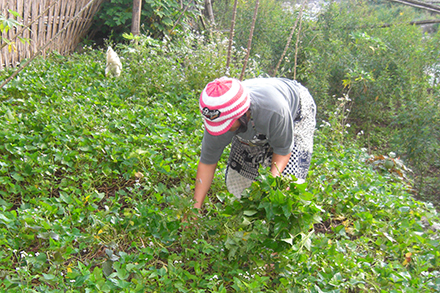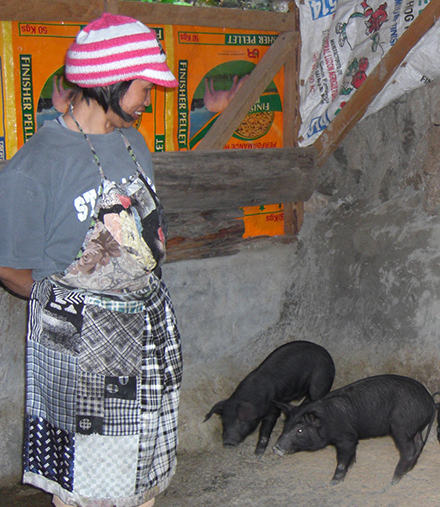See Jane Thrive
Widowed nearly two decades ago, Jane Lutong, then 34, was left to raise three small children by herself. Not an easy task when money is practically non-existent. When Jane was growing up, her family wasn’t financially able to send her all the way through school. Fifth grade was as far as she got. As an adult, despite the ever-present struggles of daily life in the northern Philippines, educating her children has been Jane’s main priority. “Poverty has denied me of a higher education,” Jane shares. “I do not want my children to suffer the same fate, so this is the only legacy I can give them.” During the very lean years, Jane’s children even demonstrated the family’s commitment to education by working odd jobs to help pay for their studies.
Jane’s house is made of pine lumber with sheets of galvanized iron for the roof. Her late husband Alejandro built the home on a high rocky bank along the Bayudan River in the mountainside village of Supang, located the town of Sabangan. It’s a bit of an empty nest now. Her oldest son, 29-year-old Alfred, is married and has a family of his own; 22-year-old Norvy and 21-year-old Je-ann are college students in Bontoc, about 90 minutes away, where they live in a boarding house. Norvy and Je-ann visit their mom every other weekend and on school breaks and holidays.

In 2011, Heifer Philippines brought a project to Jane’s community. A partnership with the Igorota Foundation, Inc., the Integrating Gift-Giving and Organizing for Overall Community Transformation Attainment (IGOROTA) Project was implemented in the municipalities of Sabangan and Bauko. Jane’s village of Supang was selected to be the main project site in Sabangan. At first, Jane was reluctant to join, saying there were no definite plans with worthwhile outputs. She believed that joining a group would be a waste of time. Norvy and Je-ann, however, thought the fellowship and promise of a better life was just what their mother needed, and they begged her to join. She finally came around to their way of thinking. “I was told that the project will give livestock and farm inputs after attending trainings,” Jane says. “At the time, I thought, ‘If all of these are true, then I have nothing to lose.’”
Before the project, Jane grew rice on a 1,000 m² terrace in the hills. The production was usually enough to feed her family of four for the whole year, with a small surplus to sell. She also kept a small vegetable garden, and she and her three children worked in other farmers’ fields for supplemental income. Jane’s family worked so hard for a paltry income of 21,000 pesos, or about $500, a year. Remembering their desperate situation, Je-ann says her mother would often become depressed and say that if their father was still alive, they wouldn’t have to suffer so much. “She became withdrawn and refused to try new things to improve herself, our lives, or our family’s income,” Je-ann recalls. “She convinced herself that there was nothing more she could do to change things.”
Upon joining the project, Jane and the other participants attended a workshop on the 12 Cornerstones for Just and Sustainable Development. “Things happened so fast,” Jane says. “Before I knew it, I was crying silently, realizing that I had imprisoned myself all these years by self-pity and insecurities.” This was a turning point for Jane. She vowed to emerge from her shell, develop her self-confidence and learn to trust others. Through this project, she found true friends in her neighbors. They learn together and are committed to helping each other.
Besides the Cornerstones, Jane and her neighbors have learned how to take care of the livestock they would receive and the money they would earn through courses on improved animal management and savings and loan management. Classes about organic farming, values-based planning, and community managed disaster risk reduction planning equipped Jane and her peers to be successful farmers.

In July 2011, Jane received a gilt, or a young female pig that hasn’t given birth, fruit tree seedlings and assorted vegetable seeds. She established a kitchen garden, where she grew bitter gourd, string beans, eggplant and cabbage. By September, the kitchen garden was making a profit. In just three months, Jane sold nearly 1,000 pesos, or about $25, worth of bitter gourd alone.
When Jane received her gifts, she requested a more mature pig that could be mated very soon. Such a pig came with a higher price tag than the project budget would allow, so Jane decided to contribute $25 of her own money to get the gilt she wanted. This proved to be a shrewd business decision. Just after the original placement ceremony, the gilt was in heat and could be mated immediately. Within four months, the pig gave birth to a farrow of piglets. Using the farmers’ field school approach on improved animal management, Jane fattened all of the piglets and, within five months, they each weighed approximately 154 pounds. She sold eight of the piglets and earned 57,300 pesos, or about $1,432.
Jane reserved the healthiest, fattest piglet to give to another family through Passing on the Gift® (POG). She presented this healthy piglet to its new family in November 2012. “I will never forget the smiles I received from my pass-on family,” Jane remembers. “They thanked me profusely. I just wanted to pass on the gift of a life without hunger, but my pass-on family said I gave them the gift of a better future. I was speechless.”
Jane’s pig has continued to deliver healthy piglets. From 2011-2013, Jane’s swine production business has brought in 199,800 pesos, or about $4,995–a far cry from her former annual income of $500.
Jane’s garden and rice farm is thriving, as well. She has a new appreciation for the impact good food has on health, and she grows everything organically. “Health and nutrition are the main reasons I maintain our kitchen garden,” Jane says. Selling extra produce is an added benefit. Jane earns 200 pesos, or about $5, a month from organic vegetables. Knowing that her family is consuming safe and nutritious food gives her peace of mind.
Jane is putting her two youngest children through college. “With all the blessings for my family, I prioritize my children’s education,” she says. “It gives me a deeper sense of peace knowing that they are prepared for their future.”
Change a life. Change the world.
See Jane Lead
Jane’s transformation from a reserved, shy and insecure widow has amazed the community. “It is unimaginable that Jane transformed to what she is now,” Marifee Lucaney, a community facilitator, shares. “Before, I often persuaded her to share in group activities and just enjoy the company of the other members. Now, she is the one who leads the group and reminds me of the plans and activities that need to be done. I cannot imagine being in the community without Jane.”
Today, Jane serves the Maggon Rural Improvement Club (RIC) as bookkeeper. Made up of IGOROTA project families, members of the Maggon RIC are mostly women, and their focus is on improving the environment through vermi-composting and periodic clean-up drives. Jane consistently leads her self-help group (SHG) in activities lined out in their Values-Based Plan and Barangay Disaster Risk Reduction Management Plan, including cleaning the village, planting trees, nursery maintenance and waste management. This diligence won Supang the “Cleanest and Greenest Barangay of Sabangan” award in 2013. The honor included special mentions of “Most Operational Nursery” and “Most Operational Material Recovery Facility” as an output of waste segregation.
Among the project’s many gifts is the renovation of Jane’s house. It has become the Barangay Food Terminal for Supang and is managed by members of the Maggon RIC.
“Jane is a good follower and that is what makes her a very good leader,” says Victoria Latowed, a fellow SHG member. “She is very quiet; she talks so little, but she works a lot. I witnessed how she developed her leadership. She is very active in all activities, be it individual, organizational or in the community. She is very strict in terms of policy implementation. You can feel her deep concern for the needs of everyone in the group and in the community. I can say that Jane is Barangay Supang’s pride.”
Jane is so respected by her peers that they chose her to represent Maggon RIC at the National Organic Agriculture Congress in June 2012, where she presented the results of her group’s vermi-composting project. The Philippines’ secretary of agriculture was one of hundreds of people in attendance. “I was trembling at first,” Jane recalls, “but knowing that my group and my village were depending on me, I regained the confidence that the Heifer project instilled in me.”
During the search for Most Outstanding RIC for 2013, Jane was interviewed by the national evaluators. She answered their questions with confidence and shared POG and savings records. Ultimately, Maggon RIC won, and the group shared their achievements during the awards ceremony at the Malacanan Palace in Manila. They stressed the importance of values-based planning for all group activities and emphasized the guidance of the 12 Cornerstones for Just and Sustainable Development. After the presentation, other RICs expressed an interest in seeing a POG ceremony in person. They wanted to visit Maggon RIC to see how the group has been so effective.
In October 2013, Jane decided to run for a seat on the barangay council. Not only did she win a seat, she earned the most votes among a total of 14 candidates. “I did not expect to win because I did not campaign at all,” she says. “I will never let my fellow families down. The overwhelming votes showed their trust in me. Their belief in me is something for which I will be forever thankful. I never thought that I could be of service to others. If they trust me that much, then it is just right that I trust myself more.”
Currently, Jane also serves as chairwoman for the village’s Committee on Agriculture. She promises to ensure that the IGOROTA project’s plans are included in the Barangay Development Risk Reduction Management Council and that the group’s Values-Based Plan will be supported by the Barangay Council. “It is not for the project families’ benefit alone,” she says. “It will be a big help for the development of Barangay Supang as a whole.”
Jane’s daughter Je-ann says, “I cannot believe the journey my mother has been through. Who would have thought that a quiet and reserved widow would lead a community? More than the tangible benefits we are receiving now from the project, my mother’s personal growth is what I love the most. Now, I am sure that mother would have a different thing to say: ‘If only your father were still alive, I am sure he would be so proud of me.’ I know we are”
Story by Jun Dom-oguen, Program Officer, Heifer Northern Philippines
and Karla Narcise-Rodulfo, PME Manager, Heifer Philippines
Photos courtesy of Heifer Philippines
